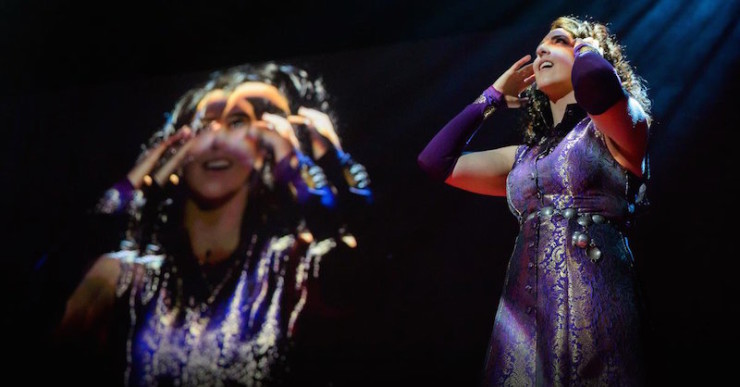In the footnotes for her recent TED Talk, The Girl in the Road author and Tiptree Award winner Monica Byrne writes, “I started thinking about constraints because of the constraints of my TED talk: I had only twelve minutes. In those twelve minutes, I’d get across…what!? The Biggest Viral Idea in Narrative Form Ever!?” For all of the wide-ranging topics that TED Talks take, there is a certain formula: a charismatic speaker with a headset and, often, visual accompaniment in the form of a PowerPoint presentation. So, for her TED Talk, Byrne—also a short story writer, playwright, essayist, traveler, and lover of fancy dresses—made herself the visual: Dressed in a lavish gown from Kambriel (recommended by Neil Gaiman) that evokes an Egyptian priestess from the future, she transformed into a 318-year-old hologram projecting into the Vancouver of 800 years from now. And for twelve minutes, she told us in the Vancouver of the past (that is, 2016) about eternal life and eternal love. As Navid, the wife of our narrator Pilar, says, “Creation needs constraint.”
Byrne’s vision of the future was inspired in part by Kim Stanley Robinson’s 2312, in which humans attain the secret to eternal life, up to a point, that is. In Byrne’s story—because it is without a doubt a great piece of short and speculative fiction, even if it’s performed instead of written out—the average human lifespan is about 432 years. Byrne has annotated her own talk, sharing her various inspirations; in addition to doubling Robinson’s prediction for human lifespan, she borrows the Radchaai’s use of the pronouns “she” and “her” to describe all people from Ann Leckie’s Ancillary Justice.
But being able to live to almost half a millennium, rather than bringing contentment, only increases humans’ fear of death. In a future where the human race has extended into the galaxy, Earth becomes a sort of old folks’ home for the end of these people’s long lives. Pilar explains what happens when Navid—a radiant person who challenges laws of mass for the sake of a good pickup line and whose favorite thing is the feel of Pilar’s body—is faced with the winding down of her existence:
It’s always funny what you think the future is going to be like versus what it turns out to be. In your time, scientists thought that humans could freeze themselves and wake up in the future. And they did, but then they died. In your time, scientists thought humans could replace organs and extend life for hundreds of years. And they did, but eventually they died anyway. In your time, Earth is the only place people live. In my time, Earth is the place people come to die. So when Navid started to show the signs, our friends assumed I would do what everyone does, which is say goodbye and send her to Earth, so that none of us would have to look at her or be around her or think about her and her failure to keep living. More than anything, they didn’t want to be around her actual, physical body. They kept referring to it as “declining,” even though she herself was fascinated by it, the changes it was going through, following the rules of its nature day by day, independent of her will. I did send Navid to Earth, but I came with her. I remember a friend of ours, just before we left, said, “I just think it’s arrogant, like the rules don’t apply to you, like you think your love is that special.” But I did.
Also this line:
I’ve always thought that what gives a life meaning is adventure, and death is just a problem we haven’t discovered the solution to yet. But maybe a life has meaning only because it ends.
I highly recommend you take the entire 12 minutes to appreciate Byrne’s writing, her delivery, and her beautiful dress. Learn more about the TED Talk on her Patreon, which helped fund the creation and performance of this story.










